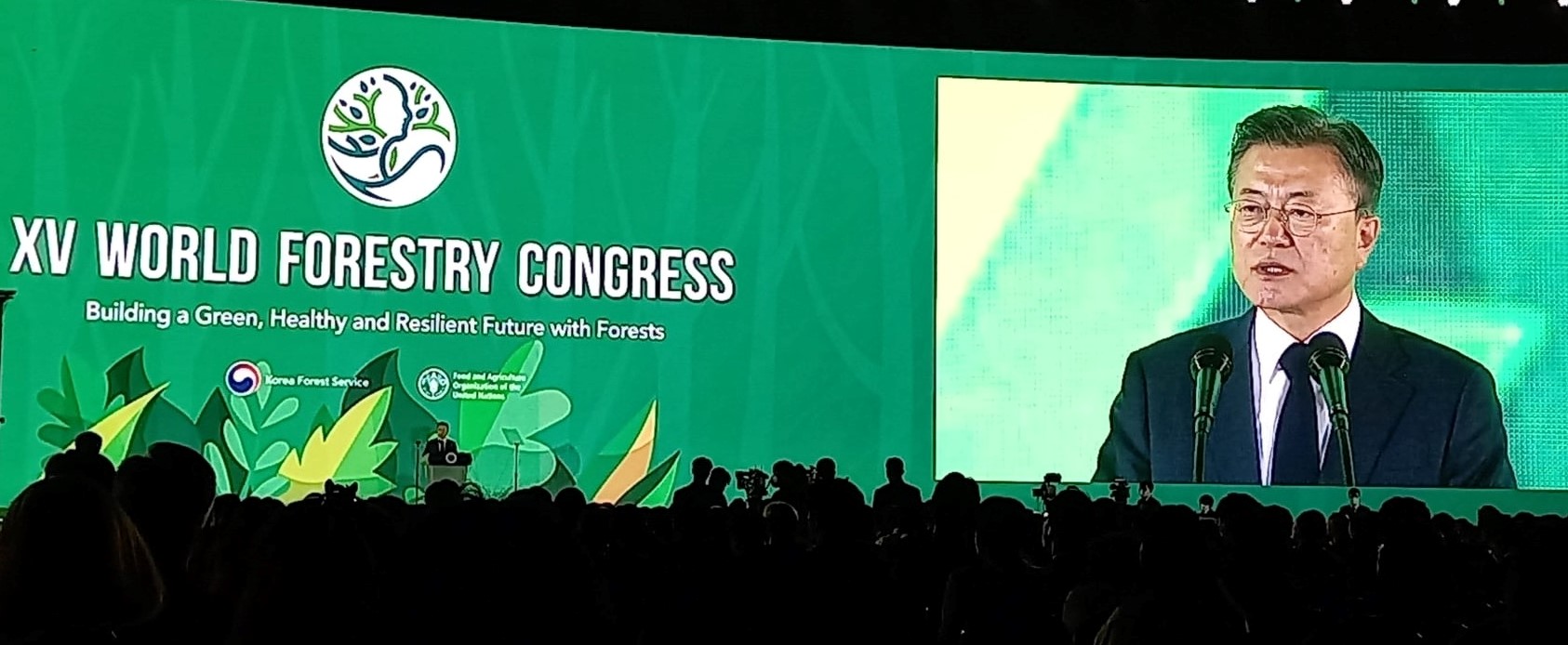
Seoul Forest Declaration Calls for Shared Responsibility towards Sustainable Forests
The Seoul Forest Declaration 2022, which is one of the major outcomes of the XV World Forestry Congress (XV WFC) in Seoul, Republic of Korea, underscores how forests can help combat the multiple crises humanity faces, including climate change, biodiversity loss, land degradation, hunger and poverty. It further highlights that future sustainable forest management responsibilities should be integrated among agencies and stakeholders.
Priority areas for actions under the Seoul Forest Declaration 2022 are - Forests, forestry and forest stakeholders should offer major solutions to the challenges the world currently faces; Investment in forest and landscape restoration globally needs to triple by 2030 to meet internationally agreed commitments and targets on restoring degraded land; Innovative green financing mechanisms to upscale investment in forest conservation, restoration and sustainable use and highlighted the potential of sustainably produced wood as a renewable, recycle and versatile material; Healthy, productive forests must also be maintained to reduce the risk of future pandemics and to provide other essential benefits for human physical and mental health; and Development and use of emerging innovative technologies and mechanisms to enable evidence-based forest and landscape decision making.
The World Forestry Congress (WFC) which started in 1926, is a significant forestry event held every six years allowing the exchange of ideas, experiences and recommendations amongst forestry experts from around the globe. With the XIV WFC held in 2015, the XV WFC which was initially scheduled for 2021, was postponed to 2022 due to the impacts of the COVID-19 pandemic.
Organised by the Food and Agriculture Organisation (FAO) of the United Nations and hosted by the Korea Forest Service (KFS) and the Republic of Korea, the XV WFC was held from 02 – 06 May in the City of Seoul, welcoming over 15,000 participants from 146 countries. With the theme “Building a Green, Healthy and Resilient Future with Forests”, the Congress provided an opportunity for dialogue amongst global forestry experts to progress the forestry agenda in the new norm whilst striving to achieve the 2030 Agenda for Sustainable Development amongst other major agreements such as the Paris Agreement on Climate Change and Global Forest Goals.
Re-emphasising the Importance of Forests
The XV WFC was opened by the President of the Republic of Korea, His Excellency Moon Jae-in, who pledged to work together with the international community to conserve forests as the impacts of the COVID-19 pandemic has proven the importance of coexisting with nature. He urged countries to find ways to transform the 2021 Glasgow Forest Pledge into action and committed the Republic of Korea to double its forest restoration efforts and overseas development assistance to developing countries.
The 5- day meeting adopted a hybrid approach demarcating various programs, sub-meetings, side events, networking events, poster and exhibition sessions that were aligned to various thematic areas that would best suit the needs and preferences of country representatives.
A total of 30 thematic dialogue sessions were held and organised under six sub-themes on issues relating to forests, and the products and services they provide. This included reversing deforestation and forest degradation; Nature-based Solutions for climate change adaptation and biodiversity conservation; forests and human health; green pathways to growth and sustainability; data and knowledge; and enhancing management and cooperation.
Several key events from the XV WFC included the high-level roundtable on the Peace Forest Initiative (PFI); the launch of the FAO’s State of the World’s Forests 2022; the Ministerial Forum on Financing; the Collaborative Partnership on Forests (CPF) dialogue; the Ministerial Forum on Sustainable Wood; the launch of the Assuring the Future of Forests with Integrated Risk Management (AFFIRM) Mechanism for fire management; and the Sustaining an Abundance of Forest Ecosystems (SAFE) initiative.
Fijian Representation
Representatives from Fiji included Forestry Executive Director for Research and Development, Ms Deborah Sue; Forestry Principal Economic Planning Officer, Ms Olivia Vakaloloma; and FAO National Forest and Landscape Restoration (FLR) Project Coordinator, Mr Maika Daveta.
The Congress was an opportunity to gain insights on sustainable development and management of Fiji’s forests, and to learn from best practices adopted by Forestry agencies around the world.
The team also delivered presentations on (i) seeds for trees, highlighting the importance of quality seeds and seedling supply for effective and resilient restoration; (ii) community forestry from a government perspective; (iii) how Fiji will develop FLR for Climate Change Mitigation & Adaptation; and (iv) participated in the plenary session on Global restoration programmes during the UN Decade on Ecosystem Restoration. During the plenary session, Ms Sue highlighted the need for Fiji to scale up its reforestation efforts with good supporting governance framework to ensure good quality forests exist to provide the various ecosystem services needed to sustain the livelihoods of forest dependents.
Apart from the Seoul Forest Declaration, other key outcomes of the XV World Forestry Congress include action proposals following the six sub-themes of the Congress; a Ministerial Call on Sustainable Wood; and a youth call for action.